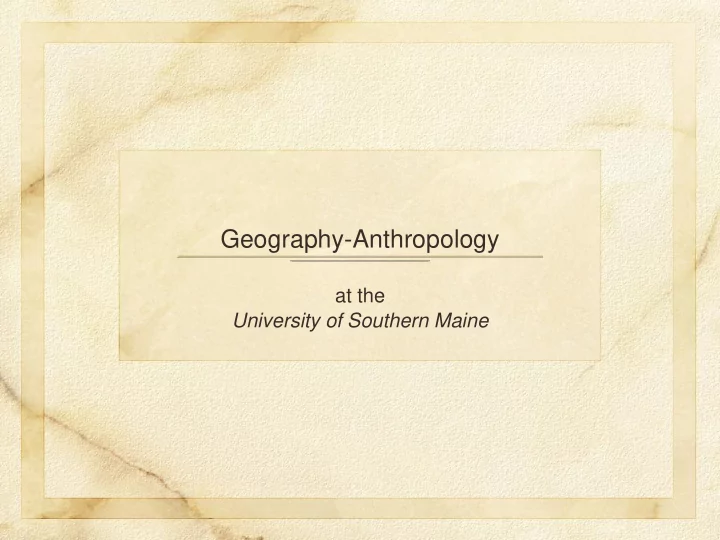

Geography-Anthropology at the University of Southern Maine
What we offer... The Program in Geography-Anthropology offers a Major (B.A.) in Geography-Anthropology with concentrations in Geography or Anthropology. We also offer Minors in Anthropology, Geography, Archaeology, and Applied Planning in Geography. A Certificate in Applied Geographic Information Systems (GIS) offers advanced training in this field.
Brief definitions of our fields Geography is the study of patterns and processes on the E arth’s surface. The discipline includes several subfields including, human and physical geography, society-environment interaction, and geographic techniques among others. Anthropology is the study of human beings, including their physical evolution and their cultural development and diversity. Its subfields include linguistic anthropology, archaeology, physical anthropology and cultural anthropology.
Who we Are: Faculty & Staff • Our faculty and staff members come from a variety of backgrounds and places. They include: Matthew Bampton, Ph.D. Associate Professor of Geography Matthew Edney, Ph.D. Professor of Geography and American & New England Studies, and Director, Osher Map Library Kreg Ettenger, Ph.D. Associate Professor of Anthropology Nathan Hamilton, Ph.D. Associate Professor of Anthropology Firooza Pavri, Ph.D. Associate Professor of Geography and Program Chair Lydia Savage, Ph.D. Professor of Geography Maggie Tinker, Administrative Assistant Vinton Valentine, Ph.D. GIS Laboratory Director
Expertise: Geography • Our program has geographers whose teaching and research cover the following subfields and areas of specialty: Physical geography and geographic information systems (GIS) Urban, economic and labor geography Environmental geography, resource management and remote sensing Historical cartography and archival research
Expertise: Anthropology • Our anthropology faculty teach in the following subfields and areas of specialty: Archaeology, historical archaeology, environmental archaeology and public archaeology Applied and environmental anthropology, tourism, cultural heritage, and digital ethnography Environmental change and sustainability
What we do: Training • We offer specialized training in areas such as the following: Geography information systems (GIS), including an 18- credit GIS Certificate Remote sensing and land use change Archaeology, including field and laboratory techniques Ethnographic research including digital media Qualitative and quantitative research methods Cartography, including digital and historical
Program Resources • Our program has the following laboratories and teaching resources available for student use: Archaeology Laboratory, with extensive collections of material artifacts from Maine and beyond Zooarchaeology Laboratory with collections of human and animal bones and casts Cartography Laboratory and extensive map and other collections at the Osher Map Library GIS Laboratory, and access to GIS software in various labs across the USM campuses Qualitative Research and Digital Ethnography Labs
Field Sites: Where we Work • Both geographers and anthropologists do much of their research “in the field,” beyond classrooms and labs. Our faculty work in the following places, among others: The James Bay region of Northern Quebec The Shetland Islands and Virgin Islands Portland, Boston and other U.S. cities Various sites in Maine, including Malaga Island and other coastal locations Western India • Students have many opportunities to join faculty in the field and even to conduct their own fieldwork.
Student Opportunities • Students in our program have opportunities to engage in research activities related to our fields and their own interests. These include: Summer field courses and research Professional internships NSF and NASA supported assistantships Independent study research projects Work study and guided research with professors Presenting at conferences and publishing their work Visits to museums, historical sites and other locations
Field Courses • Our faculty have offered structured field courses in a number of places, including the following: Archaeological field courses on the Isle of Shoals off the coast of New Hampshire, and Malaga Island and other coastal Maine locations Ethnographic and archaeological field courses in Cree Indian communities of Northern Quebec Archaeological field courses in the Shetland Islands off Scotland, and the U.S. Virgin Islands An advanced GPS mapping and sea kayaking course on islands in the Gulf of Maine
Internships • Many students complete internships at local and regional businesses and organizations. Internships help build skills and expertise while providing direct connections to jobs in our fields. Internships sites have included: DeLorme Maps in Freeport, Maine The Osher Map Library in Portland The Children’s Museum in Portland and other area museums and history centers Portland West, the Preble Street Resource Center, and other community organizations Various local and state government offices
The Knap-In • Each spring the Geography-Anthropology Student Association (GASA) hosts a one- day “Knap - In,” which features workshops and activities on traditional skills such as flint knapping (making stone points); atlatl (spear-thrower) demonstrations; and survival skills. This event helps archaeology and related subjects come alive as people watch and get to try their hands at these challenging and fun activities. The event is open to the public.
What our graduates do... • Our graduates have gone on to do many exciting things, from graduate school to rewarding careers in diverse fields. Some examples include: Graduate studies in archaeology, geography and other related fields. Work for government agencies in areas such as the environment, resource management and planning. Weather observation from the Mt. Washington Observatory in New Hampshire to Antarctica. Teaching in China and other foreign countries, and extensive travel to far points of the globe.
For more information... • To learn more about our program, to become a major or minor, or to inquire about careers in geography and anthropology, please do the following: Stop by our office in 300 Bailey Hall on the Gorham campus of USM. Our Administrative Assistant Maggie Tinker can answer questions and refer you to faculty. Call our office at 207-780-5321, or email Maggie Tinker at mtink@usm.maine.edu. See our website: http://usm.maine.edu/gany/
Recommend
More recommend